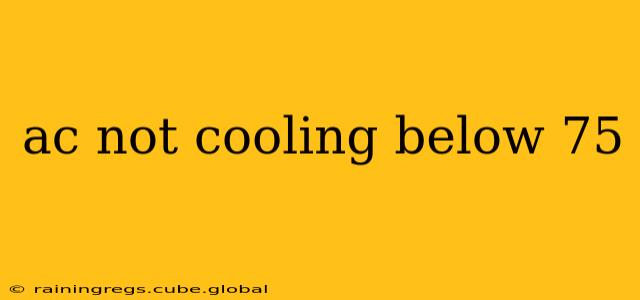Is your air conditioner struggling to cool your home below 75°F? This common problem can stem from several issues, ranging from simple fixes to more complex repairs. This guide will walk you through troubleshooting steps, helping you identify the culprit and get your AC blowing cool air again. We'll cover everything from simple checks to more advanced diagnostics.
Why is My AC Not Cooling Below 75 Degrees?
This is a frequent question, and the answer often lies in a combination of factors. Your AC unit might not be reaching the desired temperature due to a variety of reasons, including insufficient refrigerant, dirty filters, clogged vents, or even problems with the compressor. Let's delve deeper into the possibilities.
Is the Thermostat Set Correctly?
Before diving into complex repairs, ensure your thermostat is accurately set to a temperature below 75°F. Double-check the settings, making sure it's in "cool" mode and the temperature is correctly adjusted. A simple oversight can often be the solution! Also, ensure the batteries are fresh if it's a battery-powered thermostat.
Are the Air Filters Clean?
Clogged air filters restrict airflow, significantly impacting cooling efficiency. A dirty filter forces your AC unit to work harder, potentially preventing it from reaching lower temperatures. Check your air filters and replace them if they appear dirty or dusty. This is often the easiest and most cost-effective solution.
Are the Vents Obstructed?
Blocked vents restrict airflow, preventing cool air from circulating effectively throughout your home. Check all vents to ensure nothing is obstructing them – furniture, rugs, curtains, or even debris buildup can significantly impact cooling performance. Make sure all vents are open and unobstructed.
Is There a Refrigerant Leak?
A refrigerant leak is a more serious issue that requires professional attention. Refrigerant is crucial for the cooling process, and its depletion will directly impact the AC's ability to reach lower temperatures. If you suspect a refrigerant leak (indicated by weak airflow or unusual noises), contact a qualified HVAC technician immediately. Do not attempt to handle refrigerant yourself; it can be dangerous.
Is the Compressor Working Properly?
The compressor is the heart of your AC unit, responsible for circulating refrigerant. If the compressor fails, the AC will struggle or fail to cool. A malfunctioning compressor typically requires professional repair or replacement. Listen for unusual noises; loud buzzing or clicking could indicate a problem with the compressor.
Are the Condenser Coils Clean?
Dirty condenser coils (located outside your home) impede heat dissipation, reducing the AC's efficiency. Clean the coils with a coil cleaner or water hose, ensuring the unit is turned off before cleaning. This can significantly improve cooling performance.
How Often Should I Replace My Air Filters?
The frequency of air filter replacement depends on several factors, including the type of filter, the size of your home, and the number of occupants. However, a general guideline is to replace air filters every 1-3 months, or more frequently if you have pets or allergies.
Should I Call a Professional?
If you've checked all the above and your AC is still not cooling below 75°F, it's crucial to call a qualified HVAC technician. Ignoring more serious problems could lead to further damage and costly repairs. A professional can diagnose the issue accurately and provide the necessary repairs.
By systematically addressing these potential causes, you should be able to pinpoint the reason your AC isn't cooling effectively. Remember, preventative maintenance, such as regular filter changes and coil cleaning, can significantly extend the lifespan of your air conditioning system and help avoid costly repairs.
